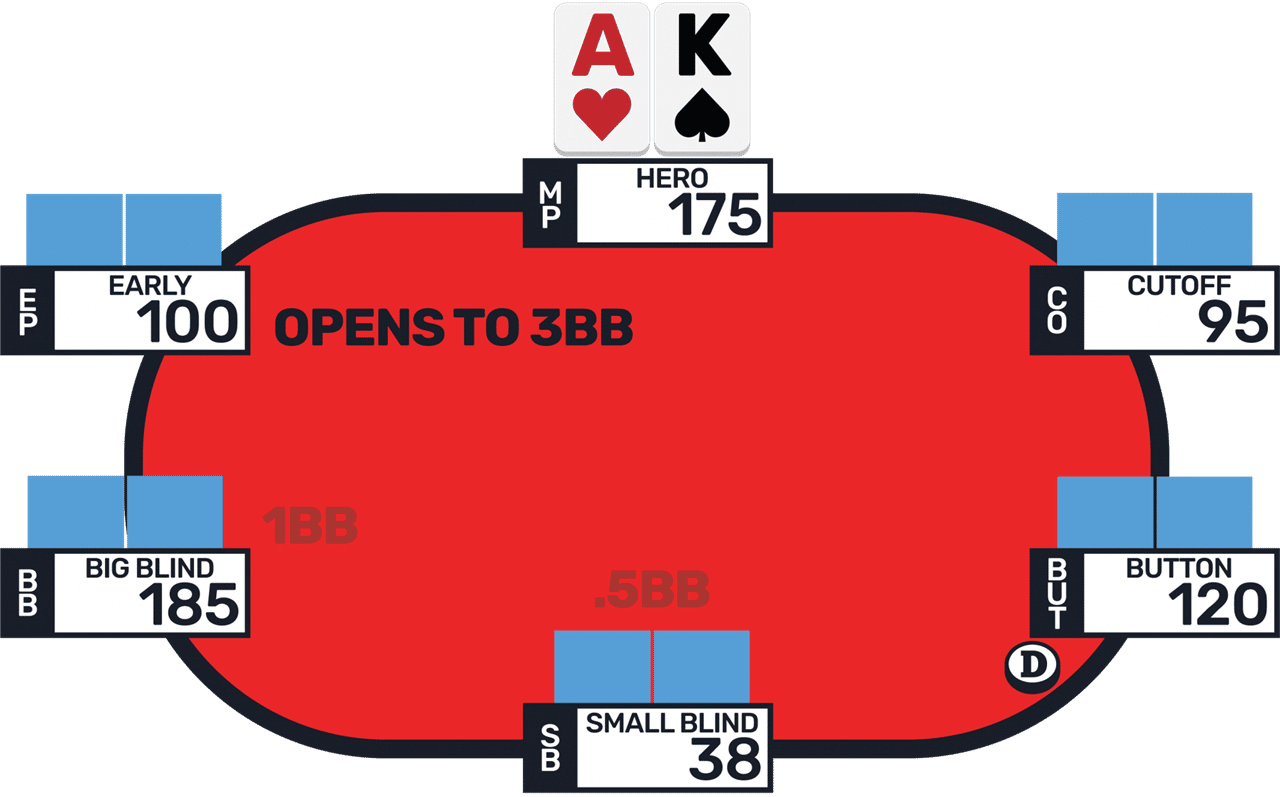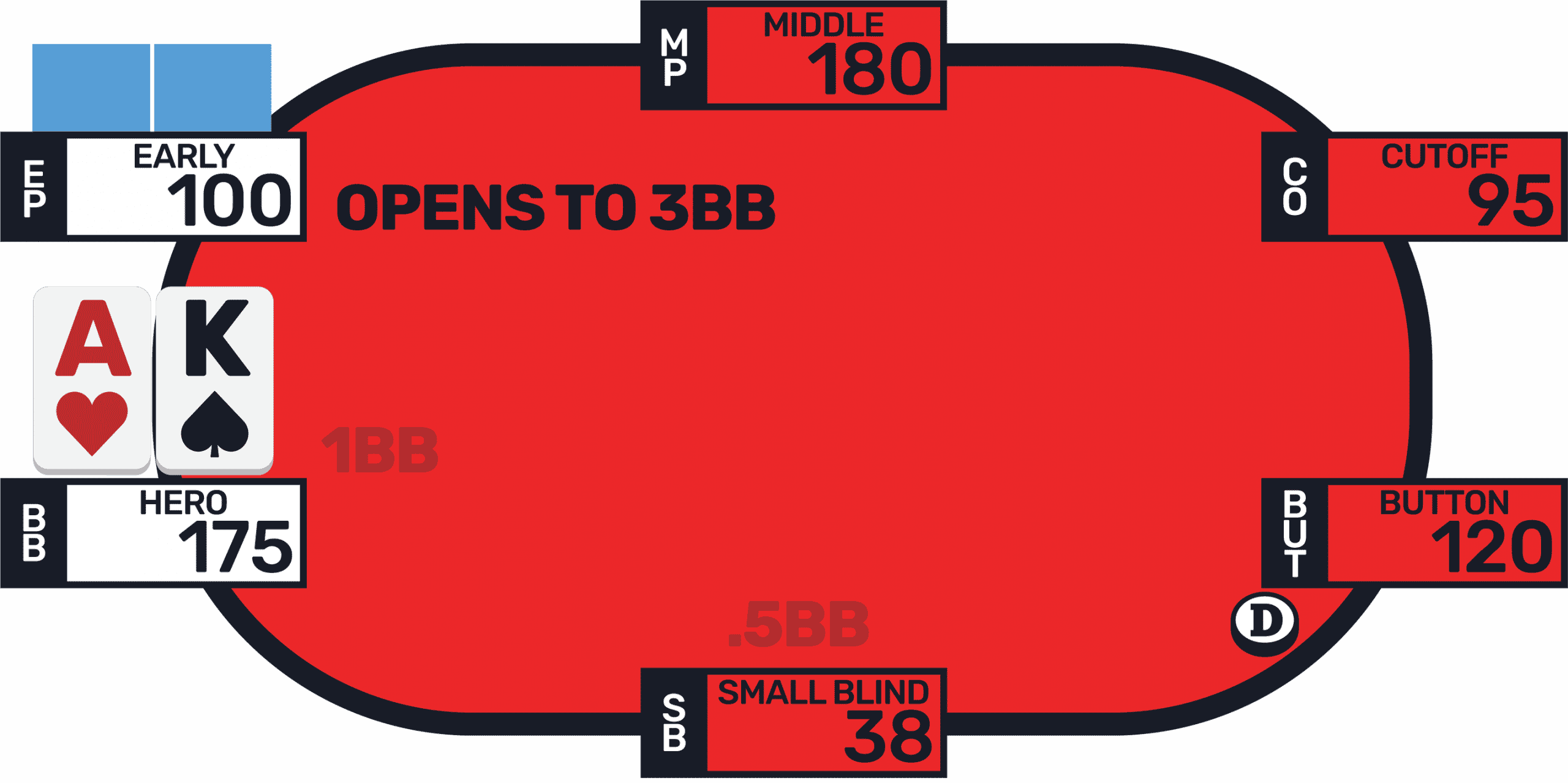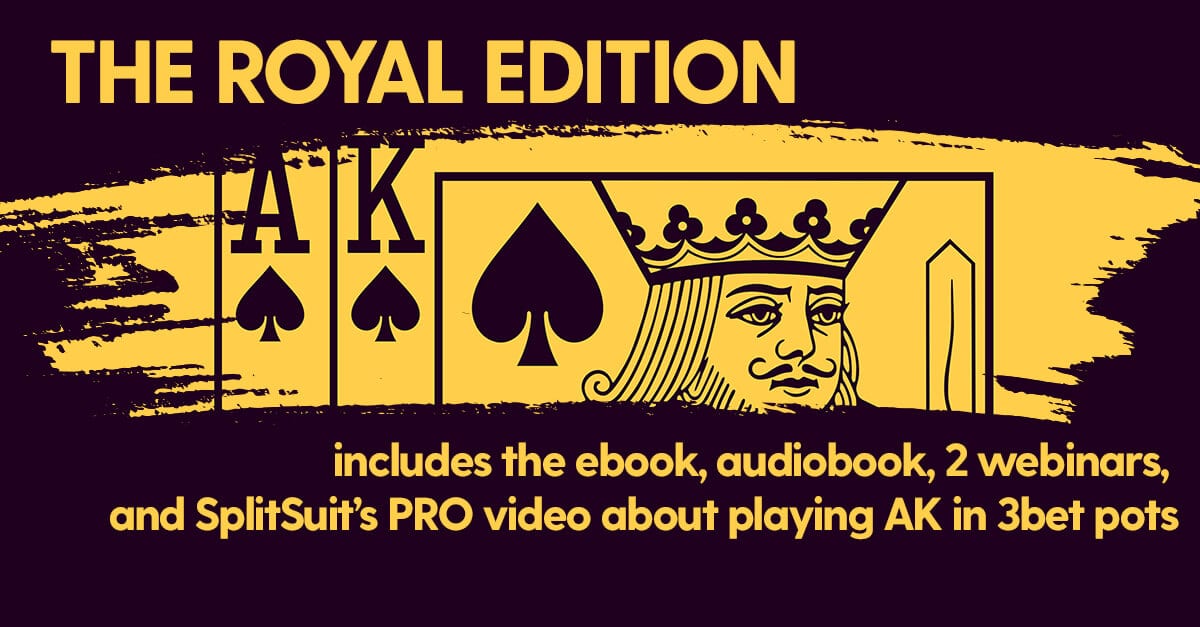Ace King is simple to play when it folds to you preflop: just raise.
But AK becomes so much trickier when someone else raises before you. Should you call their raise? Should you 3bet? Should you do a bit of both?
The answer isn’t always super clear.
The truth is that the answer of “should I call or 3bet with Ace King” relies on a number of key variables. So let’s discuss those variables, among other concepts, by answering this question:
AK plays well as a 3bet preflop in many spots, but flatting also keeps in many dominated hands that might fold to the 3bet (e.g., AJ, AT, KQ, KT, etc.). When do you think the benefit of keeping in the dominated hands is outweighed by the value of 3betting?
-David M.
AK often makes a good 3bet, but this does not guarantee that it should always be 3bet.
It is generally considered correct to 3bet AK against late-position (LP) opens – and to flat AK against early position (EP) and middle position (MP) opens.
 This is a good starting point, but as always, there are multiple variables involved. Consider the following:
This is a good starting point, but as always, there are multiple variables involved. Consider the following:
- The larger the size of our opponent’s open-raise, the less inclined we should be to 3bet AK.
- We should 3bet more aggressively against small open-raises.
- The deeper the effective stacks, the less inclined we should be to 3bet AKo out of position.
- We can 3bet AK more often against earlier positions when the effective stacks are shallow.
- 3betting in-position (IP) against EP and MP opens can be exploitatively best against opponents with a low 4bet frequency.
All of these statements are based on basic poker principles, many of which are commonly misapplied.
Start by taking just one of the statements and exploring it in more depth:
- 3betting in-position (IP) against EP and MP opens can be exploitatively best against opponents with a low 4bet frequency.
Basic game theory approximations (note: approximations, not proofs) can be made to support the idea that it is not correct to 3bet AKo against an early or middle position open. Without getting too technical, the hand just is not quite strong enough. We will struggle to continue against a 4bet from our opponent and we generally do not want to be getting it all-in preflop with AK against opponents in EP and MP for 100bb effective stacks.
The hand becomes especially bad as a 3bet if both of these factors are true:
- Our opponent is playing a “4bet-or-fold” strategy
- We do not plan on continuing against a 4bet
The value of the hand means almost nothing in such a scenario since our equity will never be realized. Many players refer to this as “turning AK into a bluff”.
But none of this guarantees that flatting is exploitatively best.
In fact, there are a number of problems with flatting AKo in MP facing an open-raise from EP. One problem is that there are players to act behind us who might over-call. AKo does not prefer to play multi-way pots, and its value will get progressively worse as more players enter the pot. (AKs is more immune from this issue).
 Even though we may not end up as a favorite against our opponent’s continuing range, 3betting has a number of advantages:
Even though we may not end up as a favorite against our opponent’s continuing range, 3betting has a number of advantages:
- We are much more likely to play AKo heads up resulting in better playability
- We generate fold equity preflop
- We still have very good equity when called, even if we end up being a small dog
- Most players do not punish us anywhere close to enough with 4bets
To illustrate this last point, an expert winning short-handed player will typically have a 4bet range of 4-5%. The average poker player has a 4bet range of closer to 2-3%. This means a couple of great things for us:
- We will rarely get 4bet off of our holding.
- If villain does 4bet, he probably has AA/KK anyway and we can dodge a bullet.
Having said all of that, given a big advantage of the play is avoiding unnecessary action behind, we should understand that the later our own position, the less importance 3betting carries. The extreme example is in the big blind. It should hardly ever be necessary to 3bet AK from the BB against an EP or MP open unless we know our opponent has significant leaks such as calling 3bets and/or opening too wide.
 Now getting back to David’s original question, and expanding on what we have already discussed throughout guide, there is an important concept to consider here. Players who open-raise and then fold to 3bets with hands like AJ and KQ can find themselves folding far too often against 3bets.
Now getting back to David’s original question, and expanding on what we have already discussed throughout guide, there is an important concept to consider here. Players who open-raise and then fold to 3bets with hands like AJ and KQ can find themselves folding far too often against 3bets.
Even though your AK does block combos of their AJ and KT, consider the following:
- If they open-raise 22+/AJ+/KQ and fold everything but TT+/AK to your 3bet,they are folding 72% of the time.
- If they open-raise 22+/ATB/54s+/75s+ and fold everything but 88+/AQ+ to your 3bet, they are folding 77% of the time.
When you find players who are folding more than 70% of the time when you 3bet, you should be actively seeking spots to attack their open-raises.
That being said, there is a benefit to calling their preflop raise and keeping all of their dominated hands involved. But consider these points:
- When you 3bet and they fold AJ, they relinquish ALL of that hand’s equity
- When you call, you allow AJ to realize some, to all, of its equity. The more passively and showdown value-heavy you play postflop, the more equity their AJ is going to realize
You should also ask yourself these questions:
- What is the estimated value when you call the preflop raise and you both flop top pair?
- What is your plan when you call the preflop raise, miss the flop, and face pressure? If you are going to play most flops fit-or-fold after calling, was calling preflop really best?
- If you 3bet preflop and your opponent calls, what is your flop plan both when you hit and miss?
Remember, the real question is not “what should I do with AK when facing an open-raise?” The better question is “what variables should I focus on to create a proper range in these situations?”
Once you refocus on that, you will know what to do here not just with AK – but with hands like AQ, AJ, KQ, etc.
This article is taken directly from the book Optimizing Ace King (OAK). I teamed up with Red Chip Poker coach “w34z3l” and together we did a full exploration of AK: breaking down key concepts preflop and postflop, when you hit and when you miss. The entire book dissects AK in a way that has never been done before on a single hand!
If you want to improve your playbook with AK and know how to handle 3bet/4bet wars preflop, when to cbet with AK-high, how to play flopped draws (even gutshots with AK), and how to craft the best line with top pair – grab your copy of Optimizing Ace King today:


Good discussion points. I prefer the call in very general terms here but as you outline, ‘it depends’ is as ever the true answer
AK off used to get me in lots of trouble when I started playing poker at the casino. I would either go over the top against people that invariably had a pocket pair or I would ridiculously just call preflop, even with no raises in front of me and try to make it happen after the flop. The problem was that at that point 4 or 5 players were in the hand and even when I would flop top pair, someone else usually hit on the flop too, with some kind of crappy 2 pair or a flush draw or straight draw and I was usually the one shaking my head and cussing under my breath after the river where I got stacked.
I play the hand marginally better these days I hope.